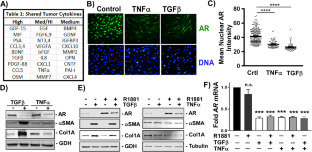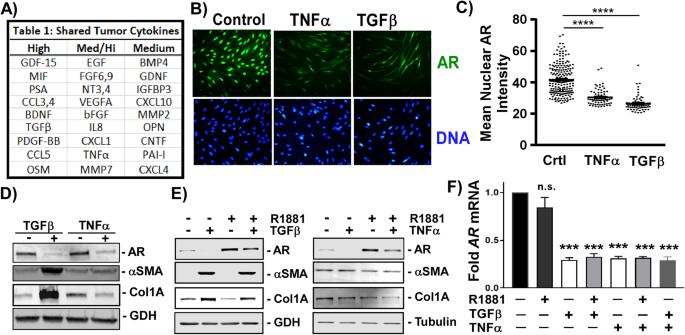前列腺癌基质中 AR 的缺失由 NF-κB 和 p38-MAPK 信号介导,会破坏基质形态发生。
IF 6.9
1区 医学
Q1 BIOCHEMISTRY & MOLECULAR BIOLOGY
引用次数: 0
摘要
前列腺基质中雄激素受体(AR)的活性是维持前列腺稳态所必需的。这是通过雄激素依赖性诱导和分泌形态形成因子来驱动上皮细胞分化。然而,在侵袭性前列腺癌中,基质 AR 的表达会丧失。导致基质AR丧失和形态发生因子产生的机制尚不清楚。我们发现TGFβ1和TNFα是能够抑制前列腺基质成纤维细胞中AR mRNA和蛋白表达的肿瘤分泌因子。药理学和 RNAi 方法确定 NF-κB 是 TNFα 抑制 AR 表达的主要信号通路。此外,还发现 p38α- 和 p38δ-MAPK 是独立于 TNFα 的 AR 表达抑制因子。AR启动子的两个区域负责通过TNFα抑制AR的表达。FGF10和Wnt16被鉴定为雄激素诱导的形态发生因子,它们的表达在TNFα处理后消失,而在p38-MAPK抑制后增强。Wnt16通过非典型Jnk信号传导,是前列腺基底上皮细胞存活所必需的。这些发现表明,基质AR的丢失是由TME内的分泌因子介导的。我们发现TNFα/TGFβ是两种可能的因子,TNFα通过NF-κB或p38-MAPK来抑制AR mRNA的转录。这导致维持正常上皮稳态所需的雄激素调控基质形态发生变化。本文章由计算机程序翻译,如有差异,请以英文原文为准。


AR loss in prostate cancer stroma mediated by NF-κB and p38-MAPK signaling disrupts stromal morphogen production
Androgen Receptor (AR) activity in prostate stroma is required to maintain prostate homeostasis. This is mediated through androgen-dependent induction and secretion of morphogenic factors that drive epithelial cell differentiation. However, stromal AR expression is lost in aggressive prostate cancer. The mechanisms leading to stromal AR loss and morphogen production are unknown. We identified TGFβ1 and TNFα as tumor-secreted factors capable of suppressing AR mRNA and protein expression in prostate stromal fibroblasts. Pharmacological and RNAi approaches identified NF-κB as the major signaling pathway involved in suppressing AR expression by TNFα. In addition, p38α- and p38δ-MAPK were identified as suppressors of AR expression independent of TNFα. Two regions of the AR promoter were responsible for AR suppression through TNFα. FGF10 and Wnt16 were identified as androgen-induced morphogens, whose expression was lost upon TNFα treatment and enhanced upon p38-MAPK inhibition. Wnt16, through non-canonical Jnk signaling, was required for prostate basal epithelial cell survival. These findings indicate that stromal AR loss is mediated by secreted factors within the TME. We identified TNFα/TGFβ as two possible factors, with TNFα mediating its effects through NF-κB or p38-MAPK to suppress AR mRNA transcription. This leads to loss of androgen-regulated stromal morphogens necessary to maintain normal epithelial homeostasis.
求助全文
通过发布文献求助,成功后即可免费获取论文全文。
去求助
来源期刊

Oncogene
医学-生化与分子生物学
CiteScore
15.30
自引率
1.20%
发文量
404
审稿时长
1 months
期刊介绍:
Oncogene is dedicated to advancing our understanding of cancer processes through the publication of exceptional research. The journal seeks to disseminate work that challenges conventional theories and contributes to establishing new paradigms in the etio-pathogenesis, diagnosis, treatment, or prevention of cancers. Emphasis is placed on research shedding light on processes driving metastatic spread and providing crucial insights into cancer biology beyond existing knowledge.
Areas covered include the cellular and molecular biology of cancer, resistance to cancer therapies, and the development of improved approaches to enhance survival. Oncogene spans the spectrum of cancer biology, from fundamental and theoretical work to translational, applied, and clinical research, including early and late Phase clinical trials, particularly those with biologic and translational endpoints.
 求助内容:
求助内容: 应助结果提醒方式:
应助结果提醒方式:


